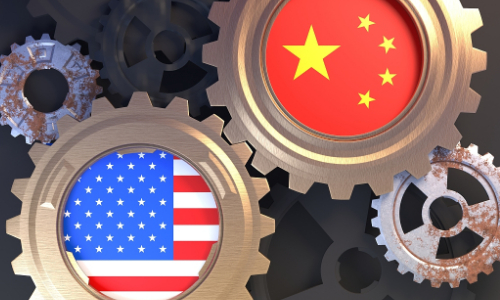US’ China policy is becoming increasingly self-contradictory and ridiculous, experts said, as while Washington wishes to send senior officials to China to seek dialogue on key issues and US military officers complain about obstacles to engaging with their Chinese counterparts, the US recently arrested Chinese Americans and charged some Chinese officials under a nonsense pretext of running a “secret police outpost.” The latest moves have further poisoned the atmosphere for bilateral ties by adding fuel to the fire of Sinophobia in the US.
In response to charges by US authorities and accusations that China is carrying out “transnational repression” in the US, Chinese Foreign Ministry spokesperson Wang Wenbin said at a routine press conference on Tuesday that China firmly opposes the US’s slanders and smears, its political manipulation, the false narrative of “transnational repression”, and blatant prosecution of Chinese law enforcement and cyber administration officials.
“The US has long suppressed dissent through secret surveillance, illegal wiretapping, global manhunts and behind-the-scenes deals. The “transnational repression” is an allegation that best matches the US’s own practices.?We urge the US to reflect on itself, abandon its Cold War mentality and ideological prejudice, immediately stop the erroneous moves, end political manipulation and stop the smears and attacks against China,” Wang said.
Washington’s approach to handling ties with China is shambolic with no clear main thrust, said Chinese analysts. They criticized US decision-makers for their refusal to correct their mistakes and for failure to remove the obstacles they set for the dialogues, while continuing to castigate China for its attitude toward the US.
US politicians expect China to turn a blind eye to what the US has done to China, while assuming Beijing will unconditionally meet requests from Washington without any opposition and retaliation, experts noted. If the US wants to resume talks between senior officials, Washington should create the conditions for dialogue by presenting concrete sincerities, said analysts.
Nonsense charge
Two Chinese Americans, both US citizens, were arrested Monday on charges that “they helped establish a secret police station in New York City on behalf of the Chinese government,” and about three dozen officers with China’s national police force were charged with “using social media to harass dissidents inside the United States,” US authorities said Monday, AP reported.
The AP said that US Justice Department officials in recent years have prioritized prosecutions of what’s known as “transnational repression,” in which foreign governments work to “identify, intimidate and silence dissidents in the US.”
A Chinese expert on international security who is familiar with the matter told the Global Times on Tuesday that this case shows that US law-enforcement and other agencies are getting more and more ridiculous as it seems like they launch ruthless charges against anything related to China, and groundlessly connect the cases to other completely irrelevant issues in the name of “national security” or “sovereignty.”
“The so-called secret police stations or police outposts mentioned by US authorities and some US media or institutions are not secret at all. They are completely transparent and just providing very basic services to local people to help them apply for visas or renew their Chinese driving licenses, and have nothing to do with law-enforcement or intelligence gathering,” said the expert, who asked for anonymity.
In this case, US authorities and media are fabricating stories based on prejudice and ideological bias to fool Americans without providing hard evidence. They pretend to be “doing a great job of protecting American values and people,” but in fact, they are abusing their power to persecute Chinese Americans and stigmatize the Chinese government. They instigate Sinophobia to poison not only China-US ties but also relations between Chinese Americans and other US nationals, the expert noted.
This is not the first time the Chinese Foreign Ministry responded to the allegation about the “Chinese overseas secrete police station.” On October 26, 2022, Spokesperson Wang said at a daily routine press conference that the so-called overseas police stations are in fact overseas Chinese service centers.
“Due to COVID-19, a large number of overseas Chinese nationals were unable to return to China in time for services such as renewing their driving licenses. As a solution to these particular difficulties, relevant sub-national authorities have opened up an online licensing platform,” Wang said.
“The purpose of the service centers is to help overseas Chinese nationals in need to access the platform to have their driving licenses renewed and receive physical examinations. I would refer you to the competent authorities if you need more details,” he noted.
“In addition, US authorities and media claimed that their actions serve the purpose of protecting ‘pro-democracy Chinese dissidents in the US, but in fact, they are protecting corrupted officials and criminal suspects facing charges in China,” Lü Xiang, an expert on US studies at the Chinese Academy of Social Sciences, told the Global Times on Tuesday.
Guo Wengui, an exiled Chinese businessman who has turned himself into a self-styled “outspoken critic of the Chinese government” is a perfect example of how this nonsense policy will backfire on the US. Guo involved himself in US internal politics deeply during the term of Donald Trump. He fled to New York and allied himself with US political figures like Steve Bannon, while being a serial fraudster who funded his lavish exile through a string of investment scams, according to media.
Guo was arrested on March 15 on charges including “fraud, conspiracy and money laundering, in connection with an alleged scheme to misappropriate more than $1bn from thousands of his online followers.”
“If US authorities want to make their country become a haven for criminals then they will get more people like Guo from China and other countries, and Americans will also become victims of their ridiculous policy,” Lü said.
Messy policy
When conducting hostile actions to attack and smear China domestically, US officials are complaining about or misinterpreting China’s attitude in handling requests from the US for communication. US Secretary of State Antony Blinken recently said China must show intention to keep engaging with the US.
Chinese Foreign Ministry spokesperson Wang responded on Tuesday that the US needs to stop interfering in China’s internal affairs and stop harming China’s interests. It needs to stop eroding the political foundation of bilateral ties while claiming that it wants to put “guardrails” on the relationship.
Lü said if Blinken and other US officials really intend to engage with China, they should create the conditions themselves, such as by stopping provocations on the Taiwan question or by canceling unilateral sanctions against Chinese legitimate development.
Similar complaints can be heard from the Pentagon. Undersecretary of Defense for Policy Colin Kahl told media that Chinese military officials “seem to have the view that crisis communications will be an excuse for the United States to create more crises, so that we can then manage them.”
A basis for exchanges in military or other areas cannot exist without mutual political trust, especially under the circumstances where the US keeps imposing sanctions on China in economic, technology and other sectors instead of withdrawing them, Song Zhongping, a Chinese military expert and TV commentator, told the Global Times on Tuesday.
Chinese State Councilor and Defense Minister Li Shangfu is still under US sanctions, and if the US wishes to communicate with China, they can just remove the sanctions to show sincerity, Lü said. “Indian Prime Minister Narendra Modi was once sanctioned by the US and banned from having a US visa, but the Obama administration handled the case pragmatically for the US-India relationship. The question remains whether the Biden administration would display the same wisdom in handling China-US ties.”
(Global Times)



